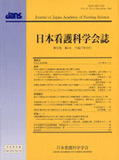Japanese
English
- 販売していません
- Abstract 文献概要
- 参考文献 Reference
- サイト内被引用 Cited by
要旨
本研究は胃がん術後患者のQOLを, 退院後の食生活や手術に伴う症状とQOLの要素である精神的健康との関連から明らかにすることを目的とした. 大学病院において胃がんで胃切除術を受け, 術後1年以上経過した再発徴候のない89名を対象に, 外来受診日に面接調査を実施した. 調査には退院後の食生活や胃切除に伴う症状等について独自に作成した質問紙および日本版General Health Questionnaire 28 (GHQ 28) を使用し, 各項目とGHQ総合得点との関連を比較検討した. 結果, GHQ 総合得点は平均 4.3点, 健常とされる5点以下が59名 (66.3%) であり, 食生活や症状とGHQ総合得点との関連をみると, 食欲がない(U=168.5, p=0.009), 食事摂取量が80%未満(U=666.0, p=0.014), 食生活が不満足(U=93.0, p=0.003), 食後の不快感がある(U=355.0, p=0.003), 苦い水が上がる(U=377.5, p=0.014), 下痢がある(U=577.5, p=0.028)患者はGHQ総合得点が有意に高かった.食欲がなく食事摂取量が減少した患者や, ダンピング症状や逆流症状のある患者は精神的健康が低下していた.
Abstract
The aim of this study is to define quality of life in cancer patients after gastrectomy by evaluating correlation between eating habits and postoperative symptoms, and psychological health. Eighty-nine patients without any symptoms of recurrence for at least 12 months after gastrectomy for cancer, in a university hospital, were interviewed using questionnaires, at the out-patient clinic. The original questionnaire, including evaluation of postoperative eating habits and symptoms associated with gastrectomy, as well as the Japanese version of General Health Questionnaire 28 (GHQ 28) were used. The correlation between the results of GHQ 28 and the results of the original questionnaire were evaluated. The results revealed that average point of GHQ 28 was 4.3. This was less than 5, which is considered healthy, in 59 patients (66.3%). The patients loss of appetite, amount of single meal intake being less than 80% of preoperative intake, dissatisfaction with eating habits, postprandial discomfort, and bitter reflux, or diarrhea were significantly higher in the GHQ 28, than that of other patients. In conclusion, the quality of psychological health deteriorated in the patients associated with loss of appetite and oral up-take, dumping symptoms, or reflux.
Copyright © 2005, Japan Academy of Nursing Science. All rights reserved.


